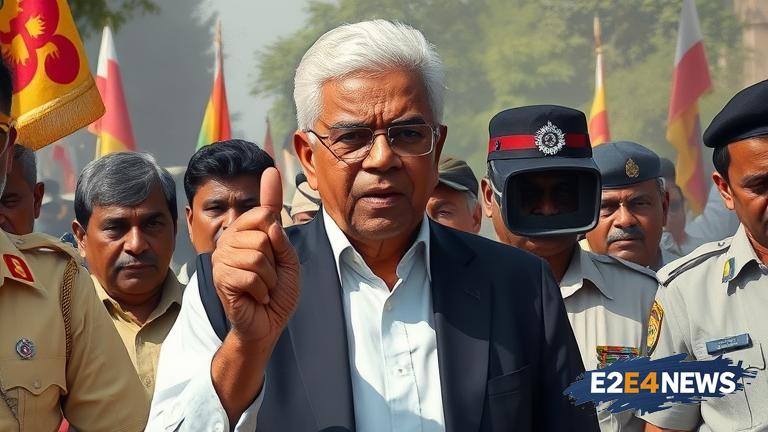Sri Lanka’s former President Ranil Wickremesinghe has been released on bail, marking a significant development in the country’s ongoing political and economic turmoil. Wickremesinghe, who succeeded Gotabaya Rajapaksa as President, has been facing intense scrutiny and criticism for his handling of the country’s economic crisis. The former President was arrested and charged with misusing public funds and failing to prevent the economic crisis that has plagued the country. The bail decision was made by a Sri Lankan court, which ruled that Wickremesinghe did not pose a flight risk and was entitled to bail. The move has been seen as a positive step towards stability in the country, which has been rocked by protests and unrest in recent months. The economic crisis in Sri Lanka has been characterized by severe shortages of food, fuel, and medicine, as well as a significant decline in the value of the country’s currency. The crisis has been blamed on a combination of factors, including mismanagement by the government, corruption, and the impact of the COVID-19 pandemic. Wickremesinghe’s government has been accused of failing to take adequate measures to address the crisis, leading to widespread anger and frustration among the population. The former President has denied any wrongdoing and has maintained that he did everything in his power to address the crisis. Despite the bail decision, Wickremesinghe still faces significant challenges and opposition, both from within his own party and from the broader population. The country’s opposition parties have called for Wickremesinghe’s resignation and have accused him of being out of touch with the needs and concerns of the people. The international community has also been critical of Wickremesinghe’s handling of the crisis, with many calling for greater transparency and accountability. The United States, in particular, has expressed concerns about the human rights situation in Sri Lanka and has called for the government to take steps to address the crisis. The European Union has also been critical of the government’s response to the crisis, and has threatened to impose sanctions if the situation does not improve. Despite these challenges, Wickremesinghe has maintained that he is committed to finding a solution to the crisis and to restoring stability and prosperity to the country. The former President has announced a series of measures aimed at addressing the crisis, including the establishment of a new economic advisory council and the implementation of austerity measures. However, these measures have been met with skepticism by many, who argue that they do not go far enough to address the root causes of the crisis. The situation in Sri Lanka remains highly volatile, with protests and demonstrations continuing to take place across the country. The government has responded to the protests with force, leading to allegations of human rights abuses and further exacerbating the crisis. The international community has called for calm and restraint, and has urged the government to engage in dialogue with the opposition and civil society. The United Nations has also been involved in efforts to resolve the crisis, with the Secretary-General calling for an end to the violence and the establishment of a national dialogue. As the situation in Sri Lanka continues to unfold, it remains to be seen whether Wickremesinghe’s release on bail will mark a turning point in the country’s fortunes. One thing is certain, however: the country faces significant challenges in the months and years ahead, and will require strong and effective leadership to overcome them. The economic crisis has had a devastating impact on the country’s population, with many struggling to access basic necessities like food and medicine. The crisis has also had a significant impact on the country’s economy, with the value of the currency plummeting and foreign investment drying up. The government has been accused of failing to take adequate measures to address the crisis, and of being more concerned with maintaining its own power and privilege than with serving the needs of the people. The opposition parties have called for a new government to be established, one that is more representative of the people and more committed to addressing the crisis. The international community has also been critical of the government’s response to the crisis, and has called for greater transparency and accountability. The situation in Sri Lanka is complex and multifaceted, and will require a comprehensive and sustained response to resolve. The country’s history and culture are rich and diverse, and the people are known for their resilience and determination. However, the crisis has pushed the country to the brink, and it will require strong and effective leadership to pull it back from the edge. The release of Wickremesinghe on bail is a positive step, but it is only the beginning of a long and difficult process of recovery and rebuilding. The country will need to come together to address the crisis, and to find a way forward that is inclusive, equitable, and just. The international community will also need to play a role, providing support and assistance to help the country recover and rebuild. The situation in Sri Lanka is a reminder of the importance of good governance, transparency, and accountability, and of the need for strong and effective leadership in times of crisis. The country’s future is uncertain, but one thing is clear: the people of Sri Lanka deserve a better future, one that is characterized by peace, prosperity, and stability.




